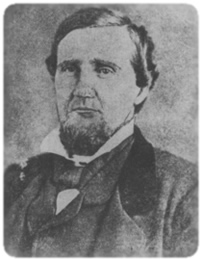Benjamin Franklin Terry facts for kids
Quick facts for kids
Benjamin Franklin Terry
|
|
|---|---|
 |
|
| Born | February 18, 1821 Russellville, Kentucky |
| Died | December 17, 1861 (aged 40) Woodsonville, Kentucky |
| Buried | |
| Allegiance | |
| Service/ |
|
| Years of service | 1861 |
| Rank | |
| Commands held | |
| Battles/wars | American Civil War |
| Relations | Col. David S. Terry (brother) |
Benjamin Franklin Terry (born February 18, 1821 – died December 17, 1861) was an important figure during the American Civil War. He was known for creating and leading the 8th Texas Cavalry Regiment. This group was famously called Terry's Texas Rangers.
Terry was a wealthy farmer who owned a large plantation in Fort Bend County. He organized his cavalry regiment to fight for the Confederate States Army. Sadly, he was killed in the regiment's very first battle. This battle took place at Rowlett's Station in Kentucky.
Contents
Early Life and Family
Benjamin Franklin Terry was born on February 18, 1821, in Russellville, Kentucky. His parents were Joseph R. and Sarah David (Smith) Terry. His grandfathers had both been officers in the American Revolutionary War. One of them also served under Andrew Jackson in the War of 1812.
When he was a boy, Terry's family moved to Brazoria County, Texas. His brother, David S. Terry, later became a judge on California's Supreme Court. Another brother, Clinton Terry, became a lawyer.
In the early 1850s, Terry helped build Texas's first railroad. This was the Buffalo Bayou, Brazos and Colorado Railway. He used enslaved people to do the hard work of building the railway.
Life as a Planter
In 1853, Terry and his business partner, William F. Kyle, bought a large farm. It was called the Oakland plantation and was 2,500 acres big. They grew cotton and sugar cane there.
Terry and his wife, Mary, lived on this farm in Sugar Land, Fort Bend County. By 1860, they had six children: David, Mary, Frank Jr., Sally, Kyle, and Cornelia.
Military Career
Because he was wealthy and well-liked, Frank Terry became a leader in Fort Bend County. On January 9, 1861, he was chosen to be a delegate. This meant he would represent his area at the Secession Convention in Austin.
At this convention, Terry and two other delegates, Thomas S. Lubbock and John A. Wharton, had an idea. They wanted to create a group of Texas cavalry soldiers for the new Confederate government.
Joining the Confederate Army
In early 1861, Terry helped disarm federal troops at Brazos Santiago. In June 1861, Terry, Lubbock, Wharton, and about fifty other Texans traveled to Richmond, Virginia. They wanted to offer their help to the Confederate Army.
In Richmond, Terry and Lubbock became volunteer assistants to General James Longstreet. They were both given the title of colonel. They fought bravely in the First Battle of Bull Run.
After this battle, the Confederate States War Department allowed them to form a cavalry regiment. On August 12, 1861, Terry and Lubbock asked for volunteers in Houston. About 1,170 men answered their call.
Terry's Texas Rangers
The volunteers officially joined the army in September. Terry waited until late November to fully organize them. They were then named the Eighth Texas Cavalry, also known as Terry's Texas Rangers.
The regiment was supposed to go to Virginia. But they were sent to Nashville, Tennessee, and then to Bowling Green, Kentucky.
On December 17, 1861, Colonel Terry led his regiment into battle. This was the Battle of Rowlett's Station near Woodsonville, Kentucky. The Confederates won the battle. However, Colonel Terry was badly wounded and died.
His body was sent by train to Nashville. The state legislature stopped their work to join the procession honoring him. His body also lay in state in New Orleans and Houston. The procession in Houston was described as the biggest ever seen in Texas. Governor Lubbock praised Terry, saying he was a very brave man and a true patriot.
Legacy
Terry County, Texas, is named after Benjamin Franklin Terry. Also, B. F. Terry High School in Rosenberg, Texas, is named in his honor.
 | Anna J. Cooper |
 | Mary McLeod Bethune |
 | Lillie Mae Bradford |

